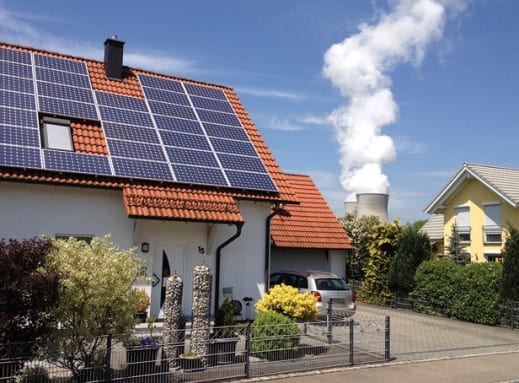This year, US Senator Lamar Alexander has lashed out against Germany as an example of where the United States should not go. The desperate attempt to reframe the Energiewende as an “energy mess” shows what the real threat is: Germany is poised to prove that a low-carbon future without nuclear is the best option for a thriving industrial country.

In February, Senator Alexander spoke about a future United States “without nuclear power – a day we don’t want to see in our country’s future.” He focused on three countries as examples, one of which was Germany. Here are five things he said (in italics) followed by my response below.
- “The cost of attempting to replace nuclear power with wind, solar, and accompanying infrastructure is estimated by the German government at 1.2 trillion U.S. dollars”
The Senator is exaggerating. He probably got the figure from former German Environmental Minister Peter Altmaier, who announced a price tag of a trillion euros for the Energiewende. But over the next 35 years (Germany has targets for 2050), this number only amounts to 30 billion euros a year. Even that amount is probably less than what we will have to pay anyway. After all, Altmaier was not only talking about phasing out nuclear, as the Senator seems to think.
Rather, Germany also aims to reduce the share of fossil fuel in Germany’s energy supply from the current level of around 85 percent down to 40 percent by midcentury. Pursuing the Energiewende is cheaper than not pursuing it. And the Germans aim to do so not only with solar and wind, but also with biomass, efficiency, smart grids, etc.

In this chart from early 2014, Germany’s Fraunhofer IWES calculated the total cost of Germany’s energy transition. The net cost impact (dotted red line in middle) is currently significantly negative, but investments in the energy sector are made for decades. The breakeven point is expected to come in around 2030, and by 2050 the hundreds of billions that Germany will have invested in a future proof, sustainable energy supply will have paid off considerably.
2) “… the subsidies for wind and solar are very high…”
Germany doesn’t subsidize wind and solar; it simply pays what these energy sources actually cost – much in the way the US government arranges prices for medical products and services in Medicare, a program not considered to be a subsidy by the American people and probably not by Senator Alexander (oh, well, never mind). In fact, given its poor wind and solar conditions, Germany has some of the lowest prices for wind and solar in the world; as I recently explained, Dubai has twice as much sunlight as Germany but does not have solar prices twice as low.

Chart 2: The price of an installed solar roof in Germany has historically been much lower than the price in the US, primarily because solar installations involve so much red tape in the US. Today, a solar array in Germany still costs only around 40 percent as much as in the US. So much for Germany overpaying for solar power.
3) “Germany does not produce enough reliable, base-load energy for an important manufacturing economy.”

In 2014, Germany already had nearly 30 percent renewable electricity and among the highest power reliability in Europe. What Senator Alexander fails to accept is an unavoidable truth in Germany: baseload power generators are incompatible with fluctuating wind and solar. And nuclear is baseload, so nuclear is incompatible with wind and solar towards a low-carbon power supply (as Americans will eventually realize when they have as much solar and wind as Germany does).
4) “So, while closing its own nuclear reactors, Germany is buying nuclear power from France, buying natural gas from a very unreliable partner, Russia, and – in a remarkable turn of events – Germany started building coal plants.”
France historically imports more electricity from Germany than it exports to Germany.

Chart 4: In 2014 and previous years, Germany was the only country from which France was a net power importer. Source: French grid operator RTE
While Germany does indeed buy natural gas from Russia (along with hard coal and oil), this situation has not changed in recent years. In fact, over the last years Germany has been diversifying its gas supply by increasing gas imports from Norway. Buying gas from Russia is not a reaction to the nuclear phaseout, particularly because most gas is used outside the power sector for heat.


Above: Sources of natural gas in Germany from 1991-2013. German dependence on Russian imports (light blue bar) has remained relatively stable, whereas dependence upon Norway (pink) has more than doubled. Source: German Ministry of Economics BMWi
Finally, since the nuclear phaseout of 2011, Germany has indeed completed construction of a number of coal plants, but none of them were a reaction to the phaseout. Coal plants generally take around six years to construct, so plants that went online in 2014 were probably first proposed around 2008 at the latest. In fact, since Fukushima Germany has canceled numerous coal plant projects without adding a single one to the pipeline.
5) “Prices are now more than double those in the U.S., and Germany has among the highest household electricity prices in the European Union.”
I’m with the former FERC chairperson on this: “We need to stop looking at rates and start looking at bills.” German power rates are high, but power bills are low by US standards. Most Germans have efficient flat screen TVs, refrigerators, washing machines, and all of the other creature comforts that Americans also love – except for air conditioning, which Germans do not need. In many parts of the US, however, air-conditioning drives up power consumption considerably. Furthermore, industries that consume a lot of electricity pay low power prices in Germany; businesses that consume less electricity pay considerably higher rates than in the US, but power bills make up a small share of expenses for these firms . Labor costs are a more important component .

Above: German household power bills are low by US standards
In conclusion, Senator Alexander is recycling Energiewende myths. During his visit to Germany, he apparently was not curious to see what was really going on. Instead, he cherry-picked numbers to trash talk the German energy transition. He complains about government support for renewables without acknowledging that nuclear only survives today because of governmental support.
His frustration is understandable: Germany is in the process of demonstrating not only that a highly industrialized country does not need nuclear power. The Energiewende also reveals that baseload nuclear is incompatible with a power supply largely based on wind + solar and that a renewable supply is the better option. As such, the Energiewende is a great challenge to Senator Alexander’s baby.
Craig Morris ( @PPchef ) is the lead author of German Energy Transition . He directs Petite Planète and writes every workday for Renewables International
This article was originally published on Renewables International – http://www.renewablesinternational.net/energiewende-doesnt-translate-as-energy-mess/150/537/87819/








